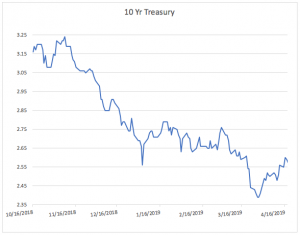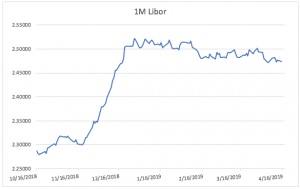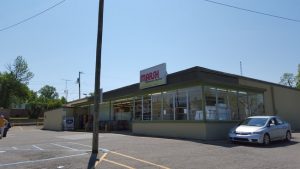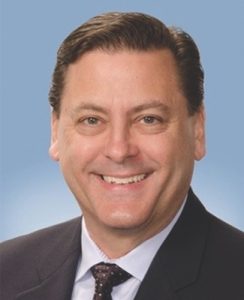December 20, 2018
The Chapel Ridge shopping center in northwest Fort Wayne will take bids on two buildings next month.
New York-based Mission Capital Advisors, working with Fort Wayne’s Sturges Property Group, will accept bids on behalf of the unnamed owner Jan. 8, 2019, according to a statement released Dec. 11. The property is real estate owned.
The property is a two-building, 8-unit, 46,641-square-foot shopping center on a 1.27-acre site near the Interstate 469-Indiana 37 interchange.
The center is shadow anchored by several national tenants including Walmart, Michaels and Kohl’s that draw shoppers into it.
Six tenants currently occupy the property up for bid, including Buffalo Wild Wings, Ziano’s Italian Eatery, Goodwill and a local swim store. Two spaces are vacant.
The majority of leases are set to roll over between 2020 and 2026.
Bids will be accepted at https://market.www.missioncap.com/memo/new?id=0063800000mJCpCAAW.
Former Toast & Jam gets Redemption
Redemption House Executive Director Tomra “Tomi” Cardin got plenty of hugs from a couple of dozens supporters after the Fort Wayne Board of Zoning Appeals on Dec. 13 approved the group opening a second site in a historic house in downtown.
Redemption House’s first location is at 2720 Fairfield Ave., where it has space for 13 women who are former nonviolent offenders referred there by the Allen Superior Court’s Re-entry program and outlying areas. They participate in skills classes, job training and other courses to prepare them to transition back into the community.
The second house is the Bostick-Keim Mansion at 426 E. Wayne St. The added location will allow the program to double its capacity by providing room for another 16 women, according to its application.
The program plans to move into the Queen Anne Victorian built in 1888 after the first of the year. The house has seven bedrooms and three full baths. Some of the features include oak woodwork, five fireplaces and stained-glass windows. The home comes with a three-car garage.
“Residents take care of the home while working jobs,” Mark Bains, an attorney with Barrett McNagny, who was representing the program, told the zoning board.
The program started as Wings of Hope in 2012.
Not all women who are referred to redemption are accepted.
“Residents are well-behaved or they’re not there,” Bains told the zoning board.
Weigand opens South Bend office
Weigand Construction Co., of Fort Wayne, a provider of construction management services, is expanding into north central Indiana with its new office completed earlier this year in downtown South Bend. Weigand’s new office, at 108 N. Main St. on the second floor of the historic JMS building, provides pre-construction, construction management, general contracting and design build services to the local market.
“In recent years, Weigand has been involved in an increasing number of projects in the north central Indiana region,” Jeremy Ringger, Weigand president, said in a statement. “Opening an office in South Bend will allow us to improve upon our existing presence while continuing to provide exceptional service to the Michiana community.”
Weigand recently completed construction of the Angela Athletic and Wellness Complex at Saint Mary’s College, a nursing simulation lab at Bethel College, and the Harris Track & Field Stadium at the University of Notre Dame, all in the South Bend area.
Ongoing projects include the Marshall County Aquatic Center in Plymouth, a 40-bed Vibra Health Rehabilitation Hospital in Mishawaka, the Andreasen Center for Wellness at Andrews University, and a lean-designed beam processing center for Lippert Components in Goshen. All four projects are new construction, and all are scheduled for completion in 2019.
Weigand Construction was founded in 1906 and serves clients throughout the Midwest. It has over 300 skilled tradespeople and annual revenues above $200 million.
The Zacher Company
Fletcher Moppert and Steven Zacher represented the seller, Trelleborg Seal, in the sale of a 48,500-square-foot industrial building at 1151 Bloomingdale Drive in Bristol to 1151 Bloomingdale Drive LLC.
Moppert represented both the landlord, P&A Realty Inc., and the tenant Fastenal in the lease extension of 7,500-square-foot industrial space at 4105 Engleton Drive, Fort Wayne.
Evan Rubin represented the buyer, I.O.O.F Harmony Lodge No. 19 Inc., in the purchase of a 4,912-square-foot office building in Sleepy Hallow Professional Offices at 7325-7327 W. Jefferson Blvd., Fort Wayne.
John Adams represented both the landlord, Boulder Ridge Professional Offices Corp., and the tenant, G6 Communications LLC, in the lease of a 1,680-square-foot office space at 10848 Rose Ave., New Haven.
Joy Neuenschwander and Moppert represented both the landlord, Alea Properties Office I LLC, and the tenant, Larson Financial Group LLC, in the lease of a 1,319-square-foot office space at 7230 Engle Road, Fort Wayne.
Neuenschwander represented the landlord, DCL Scott Corp., and Neuenschwander and Rubin represented the tenant, Long Tail Corp., in the lease extension of a 1,106-square-foot office space at 5738 Coventry Lane, Fort Wayne.
Adams represented the landlord, Harrison/Wayne LLC, in the lease of office space at 203 W. Wayne St., Fort Wayne, to Jarencio Valcarcel.
Bradley Company
Lucas Demel and Steve Chen represented the landlord, BRV‐X LLC, in the lease negotiation of retail space for a wireless tenant at the new Dupont Pointe Shopping Center, 5131 E. Dupont Road.
Demel and Chen represented the landlord, BRV‐X LLC, and the tenant, the Guy’s Place, in the lease negotiation of retail space at the new Dupont Pointe Shopping Center, 5131 E. Dupont Road.
SVN-Parke Group
Diana Parent represented the landlord of the PNC Center and the tenant, Headwaters Park Alliance, in their lease renewal of Suite 2012.
Whitney Peterson represented the landlord of the PNC Center and the tenant, Christopher Alexander, in a new executive suite’s lease for Suite 2102.
Parent represented the seller, Brookside Community Church in the sale of 5.44 acres at 6031 Evard Road.
Troy Reimschisel and Anna Bowman represented BOER Inc., the landlord of 4115 Clubview Drive, in the recent lease of 2,500 square feet of flex space to Franchise World Headquarters LLC.
LISA ESQUIVEL LONG is a freelance journalist who is filing in for Business Weekly Associate Editor Linda Lipp while Lipp is out of the office.
See more here:
 Underlying HELOC fundamentals continue to improve alongside a strengthening US labor market and continued housing price appreciation. Secondary market HELOC pricing/yields have benefitted from the recent rally in the fixed income and credit markets.
Underlying HELOC fundamentals continue to improve alongside a strengthening US labor market and continued housing price appreciation. Secondary market HELOC pricing/yields have benefitted from the recent rally in the fixed income and credit markets. The credit line can be used to cover future costs such as medical bills, home renovations, student tuition, or emergencies. HELOCs bear lower interest rates than other comparable revolving facilities such as credit cards. HELOCs and other 2nd liens usually see an uptick in origination volumes when interest rates rise, since it’s more economical for borrowers to take out a second mortgage instead of refinancing an existing low fixed rate. Generally speaking, HELOCs lost the benefit of interest deductibility with the recent tax law changes, subject to some grandfathering provisions.
The credit line can be used to cover future costs such as medical bills, home renovations, student tuition, or emergencies. HELOCs bear lower interest rates than other comparable revolving facilities such as credit cards. HELOCs and other 2nd liens usually see an uptick in origination volumes when interest rates rise, since it’s more economical for borrowers to take out a second mortgage instead of refinancing an existing low fixed rate. Generally speaking, HELOCs lost the benefit of interest deductibility with the recent tax law changes, subject to some grandfathering provisions.













 NEW YORK (Dec. 20, 2018)
NEW YORK (Dec. 20, 2018)